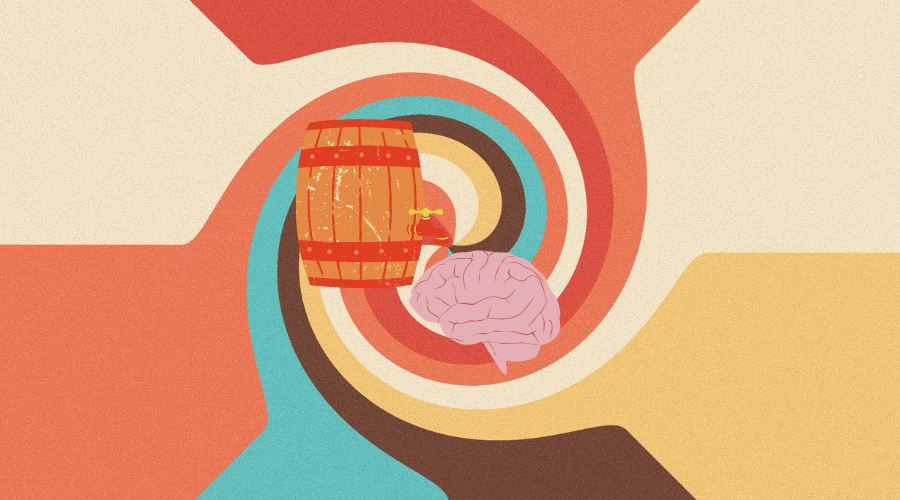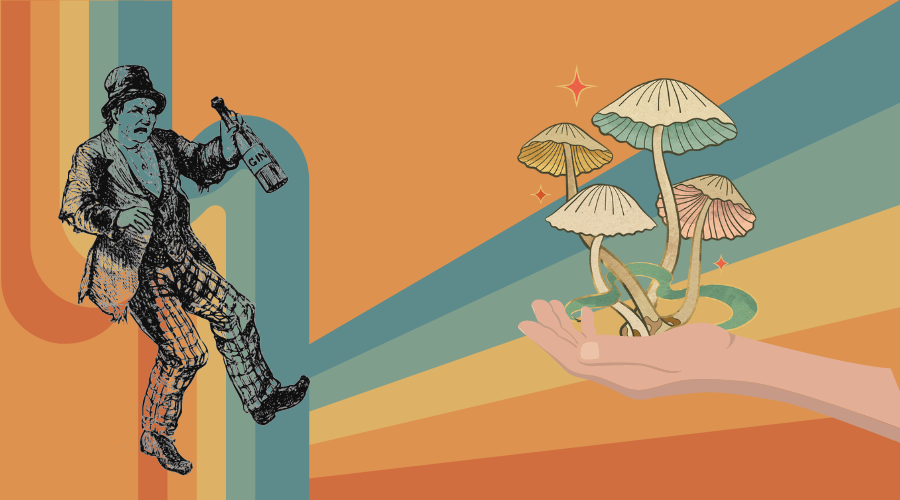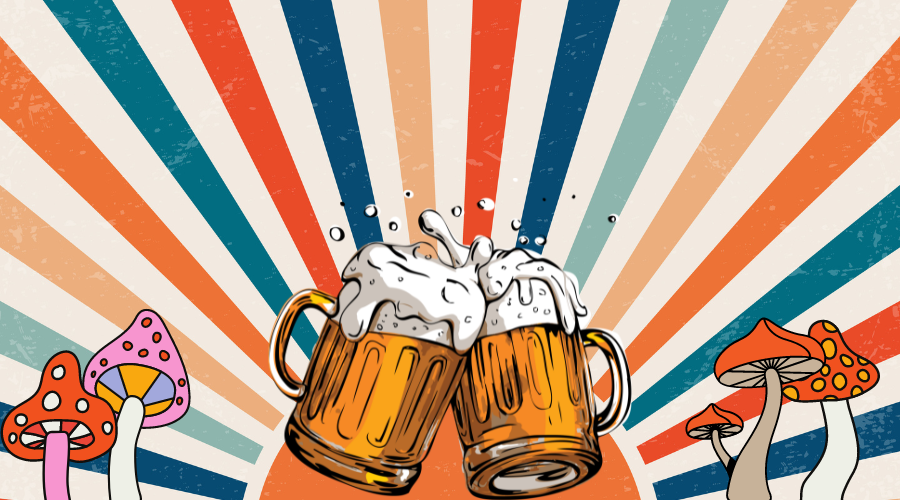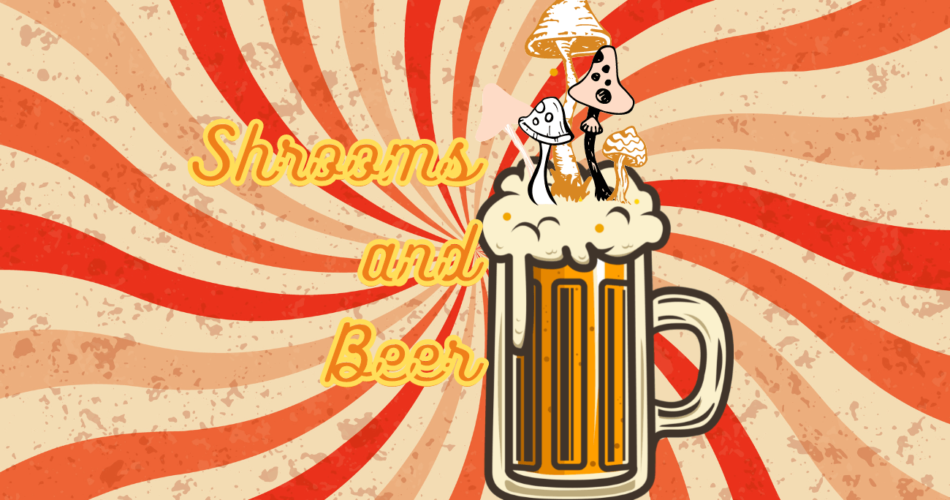Shrooms and beer? They can seriously impact one’s cognitive function, mood, and behavior. Today, we will discuss the effects of alcohol and shrooms combined, and provide a few tips. Let’s get started!
TL;DR
- Shrooms and beer are not very safe to be combined ❌
- Psilocybin mushrooms and alcoholic beer are two different classes of substances – a stimulant and a depressant, respectively 🍄🍺
- Currently, a few studies suggest a potential use of psychedelics, like shrooms and LSD, to treat Alcohol Use Disorder (AUD) ✔️
- If you want to take these two together, do so in a safe space, and keep yourself hydrated 💦
What Does Beer Do to Your Brain?

Drinking beer affects the brain in various ways, both short-term and long-term. Drinking alcohol:
- Impairs cognitive function: Beer is a depressant, which means it slows down brain activity.
- Alters mood: Beer can affect the brain’s neurotransmitters, leading to changes in mood. Some people feel relaxed or euphoric after drinking beer, while others become irritable or aggressive.
- Increases risk of addiction: Drinking beer can increase the release of dopamine in the brain, which can lead to alcoholism if consumed regularly and in large quantities.
- Causes dehydration: Beer is a diuretic, which means it increases urine production, and leads to dehydration. Dehydration can cause headaches, fatigue, and nausea.
- Affects sleep: Drinking beer affects sleep by disrupting the REM cycle, leading to poor quality sleep and daytime drowsiness.
- Increases the risk of brain damage: Heavy drinking over a prolonged period can lead to brain damage, including shrinkage of brain cells.
The Effects of Mixing Magic Mushrooms with Beer
Mixing a hallucinogen with any alcoholic beverage is not recommended. Here are some potential effects of shrooms and beer:
- Shrooms are a hallucinogenic substance which alters perception, mood, and thought processes. When consumed, psilocybin binds to serotonin receptors in the brain, leading to changes in the perception of reality.
- When combined with alcohol, the effects of psilocybin can be amplified, leading to a more intense and unpredictable experience. This includes: strong hallucinations, paranoia, anxiety, and panic attacks; as well as an increased risk of accidents, injuries, and other dangerous behaviors.
- Moreover, alcohol is a depressant that slows down brain function, while psilocybin is a stimulant that can cause rapid firing of neurons. The combination of these two substances can lead to conflicting effects on the brain, potentially leading to seizures, convulsions, or other adverse reactions.
Editor’s Note 🍄
I’m not a “fun police,” but I do believe in speaking the truth. And that is: unlike shrooms, alcohol does not have ANY positive outcomes on neither the mind nor the body. And if you’re struggling with substance abuse, mixing drugs with alcohol can only make it worse.
Alcohol Addiction and Recreational Use of Shrooms

Alcohol addiction is a serious health condition that requires professional treatment, and the recreational use of shrooms should not be viewed as a substitute for proper medical care. However, there is some anecdotal evidence suggesting that shrooms may have therapeutic potential in the treatment of addiction.
Studies have shown that psilocybin, the active ingredient in magic mushrooms, can produce profound and long-lasting changes in personality, mood, and behavior. Some people report that the experience of taking shrooms helps them gain insight into their addictive behavior, leading to a greater sense of self-awareness and a desire to change.
Additionally, some research suggests that psilocybin may have therapeutic potential in the treatment of addiction by disrupting maladaptive patterns of thought and behavior. For example, a study published in the Journal of Psychopharmacology found that psilocybin-assisted therapy helped people overcome tobacco addiction by reducing cravings and increasing abstinence rates.
However, the recreational use of shrooms is still illegal in many parts of the world; and there is still much that is unknown about the potential risks and benefits of this substance. Furthermore, people with a history of mental illness or certain medical conditions should not use shrooms.
Shrooms and Beer Combined: Consumption Tips

Still want to combine shrooms and beer? It could potentially be a fun time, but you should enjoy the experience safely.
- Be aware of your own personal tolerance to shrooms and alcohol before participating in shrooms and beer. This can help ensure that you don’t overdo it or put yourself in an undesirable situation by drinking too much and tripping.
- Keep some trusted friends around who can help look out for your wellbeing while you partake in the shroomy goodness.
- Hydration is key! Make sure to drink plenty of water to keep yourself well-hydrated so that you can truly appreciate the shroom and beer experience without any risks.
In conclusion, shrooms and beer are not to be combined. Together, they can result in a bad trip, decreased cognitive performance, and overall physical distress. If you decide to consume both of them, make sure you do that carefully.
Similar Posts:
- Drinking on Shrooms: Good Idea? Hallucinogen & Psychedelic Magic Mushrooms
- LSD and Alcohol: What Are the Effects of Mixing These Two Substances?
- Is LSD a Stimulant or a Depressant, or Perhaps a Hallucinogen? Simple Facts
- Are Shrooms Addictive? Psilocybin Mushrooms & Magic Mushrooms Addiction
- What Do Shrooms Do to Your Brain? Magic Mushrooms & How They Affect the Brain
- Coffee and Shrooms: Can You Mix Magic Mushrooms With a Cup of Coffee?
- Prozac and Shrooms: Is This Antidepressant Safe to Take With Psilocybin?






